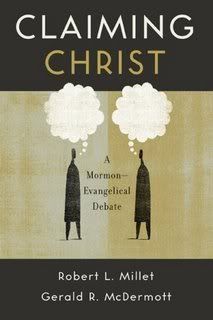Claiming Christ: A Mormon-Evangelical Debate
 Robert L. Millet (Professor of Ancient Scripture BYU) and Gerald R. McDermott (Professor of Religion Roanoke College) co-authored a new book entitled Claiming Christ: A Mormon-Evangelical Debate. With the recent presidential candidacy of LDS Mitt Romney and former Baptist minister Mike Huckabee, there has been an increase in press coverage about the LDS church and a little antagonism between Mormons and Evangelicals. This Book by Dr. Millet and McDermott seeks to find common ground between the two faith traditions as well as respectfully discussing distinctions.
Robert L. Millet (Professor of Ancient Scripture BYU) and Gerald R. McDermott (Professor of Religion Roanoke College) co-authored a new book entitled Claiming Christ: A Mormon-Evangelical Debate. With the recent presidential candidacy of LDS Mitt Romney and former Baptist minister Mike Huckabee, there has been an increase in press coverage about the LDS church and a little antagonism between Mormons and Evangelicals. This Book by Dr. Millet and McDermott seeks to find common ground between the two faith traditions as well as respectfully discussing distinctions.
Dr. McDermott concedes that Mainstream Christianity has been falsely persecuting the LDS faith. In Dr. McDermott's view, the LDS should be rightly considered a Christian faith as they recognize Jesus Christ as God and the only way to salvation. However, he does take issue with three points of LDS doctrine concerning the relationship between God and man, creation out of nothing, and modern authorized revelation as non-Biblical.
Dr. McDermott says that it is unfair for Evangelicals to claim they hold to the principle of "sola scriptura" in all their beliefs as many Evangelical beliefs such as the Trinity and other creeds are post-Biblical interpretations. So, he concedes, like Mormons, even Evangelicals interpret the Bible through the lens of their faith tradition.
While Dr. McDermott insists that Evangelical interpretation of the Bible is more Orthodox and contextually correct than LDS interpretation, he seems to contradict himself. Dr. McDermott argues that understanding correct doctrine is important in ones ability to know Christ and receive Christ's love, receive forgiveness for sin and salvation, and apply the benefits of Christ's sacrifice generally. However, he goes on to say that while Mormons could learn from Evangelical orthodoxy (correct belief), Evangelicals could learn from Mormon orthokardia (correct heart), and orthopraxis (correct behavior). That said, if Dr. McDermott believes Evangelicals have the corner on the market on doctrine, one wonders why Evangelicals aren't the "good neighbor" examples he praises Mormons to be.
Dr. McDermott criticized the popular Evangelical concept of "Lone Ranger worship" and "cheap grace." Both Dr. Millet and McDermott agree that salvation is based only on the grace alone of Jesus Christ's sacrifice and death and not works. But, they both concede that good works done with pure intent are then a manifestation of the Holy Ghost sanctifying the believer who has accepted Christ, who has been justified by His blood, and who has received of His love. The Bible and the Book of Momon teaches that the flesh is incapable of doing good on its own. Consequently, all good works come from the reception of Christ's love, and the inspiration of the Holy Spirit.
I think Dr. Millet could have argued stronger for the LDS views on Christ, the pre-existence, creation and modern revelation (including the Book of Mormon). He seems to concede that while the Bible can be interpreted to support all these doctrines, many are more clearly based on mainly extra-biblical sources and modern revelation. Dr. Millet seems content to present the LDS message and is happy to allow Dr. McDermott to argue with him in favor of LDS Christianity.
Dr. McDermott happily presents what he believes is the perfect Biblical parallel to explains the Mormons. He likens the LDS people to the Samaritans of the New Testament. Jesus Christ did preach among them and used them as examples of Christ-like love (parable of the Good Samaritan). Notwithstanding, the Jews considered them apostate and persecuted them. However, Dr. McDermott forgets that according to the Bible the Jews at Jerusalem were probably considered more apostate than the Samaritans.
Dr. Millet and McDermott agree in the end that both Evangelicals and LDS can pray together, and they can work together on social issues of common concern such as strengthening family and community values. While Dr. Millet said he enjoyed attending Evangelical services, Dr. McDermott seemed to discourage evangelicals from worshiping with the LDS saying that our differences in belief on God would make proper worship "impossible."













No comments:
Post a Comment